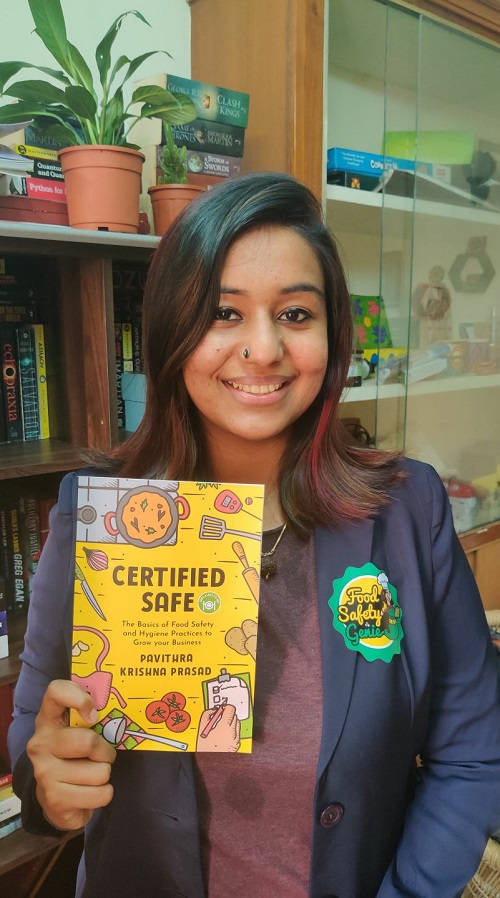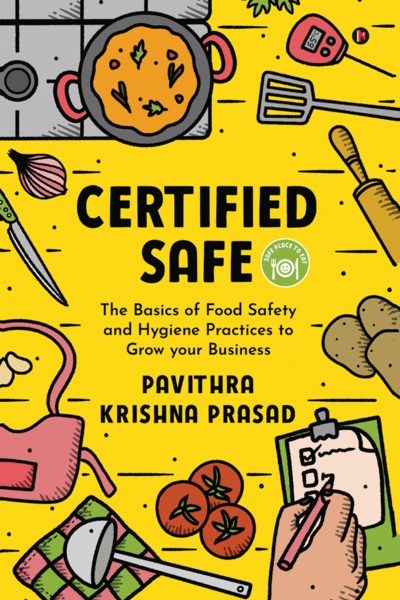Food safety specialist Pavithra Krishna Prasad talks about her book, Certified Safe and how to make safe food a priority.
The pandemic has completely changed the simple act of getting together for a meal. The restaurant sector is one of the many industries to bear the brunt of the pandemic. According to a recent report, only 17 per cent of restaurants with the option to dine out are now open for business. More than 40 per cent face uncertainty about their future.
Food safety is a much talked about topic in this respect. It’s not like unsafe food was acceptable before, but let’s just say that the magnifying lenses are now being been dusted and put to use. In these times, having someone tell you exactly what your food establishment needs to prioritise safety is a gift indeed. And that someone is Pavithra Krishna Prasad.
Pavithra is a trained food safety specialist who helps food establishments meet their safety needs. She is a Certified Hygiene Rating Auditor and is also trained in Covid-19 awareness. Her book Certified Safe: The Basics of Food Safety and Hygiene Practices to Grow Your Business was published in September 2020. This short book packs all the essential details for small-scale food businesses to implement food safety measures. By breaking down complex safety regulations into FAQs, to-do lists and guidelines, Pavithra makes it all seem like a piece of cake – a very safe piece at that.
Her website, Food Safety Genie, provides a plethora of information on the topic of food quality and safety through videos and podcasts.
So here is Pavithra talking about her book and her love for safe food.

TYT: How did you get interested in food safety?
Pavithra: After completing my masters in Food Processing, I was in a dilemma about which path I should take in the food industry. I knew that I was not interested in working on aspects related to food and nutrition. I began my career as an intern for a company manufacturing cold-pressed juices, where I worked on customer support and quality control. The experience gained through this role really helped shape my ideas on food safety. I realised that not only is this a niche area; there is also a lot of potential to improve the way safety practices are followed. In India, five-star hotels and bigger establishments are well-equipped to implement food safety measures. But, it is the smaller places that get more footfall. People love visiting their regular haunts, and these are the places that really need some attention in terms of hygiene and safety. It is important to note that money does not matter when it comes to food safety. Even if you are a small food vendor, with a few simple steps and with some awareness about the safety regulations, you can easily stand out. This is what I want to convey through my work. I want people to know that you can make food safety a part of your venture.
TYT: How aware are food entrepreneurs about safety regulations? What are some of the common mistakes that they make?
Pavithra: There is awareness, but the bottleneck is communication and having the bandwidth to accommodate food safety practices. The smaller establishments don’t have an assigned person to look into the food safety aspects. In many places, the manager is also the supervisor, the person who has to train all the staff members and close the accounts at the end of the day. Sometimes they are even expected to interact with and attend to the customers. With so much going on, they really cannot pay as much attention to food safety and communicate what needs to be done to their staff members. That is where the problem arises; not because they don’t want to do anything, but because they are just not able to.
Many new establishments also focus on growing their business and selling more food. They get into scale without prioritizing food safety. It has to be an organic part of your plan. Once you move forward without factoring in safety measures, it becomes very difficult to do so at a later stage.
TYT: Your book has come out at a time when food safety and hygiene have become even more important. Did this change your approach for the book?
Pavithra: I really don’t think that it should change anything from a food safety point of view. Virus or no virus, safe food must always be a priority. Washing your hands when you are handling food is basic etiquette. Isn’t it strange that we need to be reminded of this constantly in the middle of a global pandemic? So, to answer your question, I have included temperature checks keeping the pandemic in mind. Rest of the safety measures, especially simple ones like washing hands, wearing gloves, different cutlery for different products like fish, vegetables, baked goods – they are the norm. This will not change for a pandemic-less world. I did revisit several parts of the book to make the information universally appealing. When I started working on the book, I had packed it with way too much information. So I reworked the content to make it useful for anyone interested in delving into the subject.
I would like to add here that food safety measures are not rigid, and it is possible to make changes or adaptations based on the establishment’s capacity and needs. What is important is that these recommendations come from someone who knows and understands the regulations.
TYT: Most important advice for budding food entrepreneurs?
Pavithra: I have a bit of general advice and one that is related to food safety.
Until I started working as a customer support executive, I had no idea that talking to people and understanding their concerns was something that I was good at. It really gave me the confidence to create an identity as an independent consultant. I would like to tell budding food entrepreneurs to grab every opportunity that comes their way before they venture out on their own. This will help them find and develop skills that will be useful to them in the long run.
With respect to food safety, I think it is important that entrepreneurs have strong foundational knowledge about food safety norms. Regulations change often, and they should be able to keep track of these changes. This won’t take much of their time; maybe an hour every day. It will help entrepreneurs and will also help them gain the trust of their customers.
TYT: India has a vibrant street food culture. How do you think street food vendors can be made aware of food safety norms?
Pavithra: There is a training program offered by FSSAI (Food Safety and Standards Authority of India) called FosTac – Food Safety Training and Certification. This program applies to various verticals within the industry like manufacturers, caterers, chefs, food handlers and also street food vendors. The information is conveyed in a manner that is easy to understand and implement. The training covers all the basic pain points like what kind of water should be used, how to handle the food in a safe manner, etc. The training program is greatly beneficial to establish hygienic street food units.
Thank you, Pavithra for a very enlightening and practical overview on the topic of food safety. If you are getting started with your food business, have already spent a few years in it or just curious about the subject – here is a book that you don’t want to miss. Make sure to reach out to Pavithra, aka Food Safety Genie with your questions and concerns.
